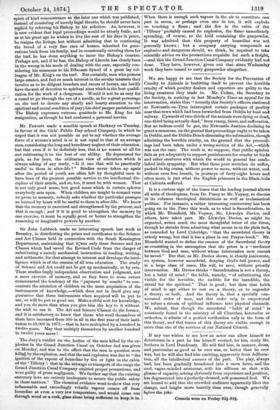It is a curious sign of the times that the
leading journal allows all sorts of theologians, from Dr. Pusey to Mr. Voysey, to discuss in its columns theological distinctions as well as ecclesiastical politics. For instance, a rather interesting controversy has been going on in the Times this week, as to what is Sacerdotalism, in which Mr. Blomfield, Mr. Voysey, Mr. Llewelyn Davies, and others, have taken part. Mr. Llewelyn Davies, as might be expected, writes much the most thoughtful letter of the three, though he shrinks from admitting what seems to us the plain fact, as conceded by Lord Coleridge, "that the sacerdotal theory is utterly wrong, but that it has a place in our Prayer-book." Mr. Blomfield wanted to define the essence of the Sacerdotal theory as consisting in the assumption that the priest is a "mediator between God and man, without whose intercession men cannot be saved." But that, as Mr. Davies shows, is clearly inaccurate, no system, however sacerdotal, denying God's full power, and in a large class of cases, His will, to save, without priestly intervention. Mr. Davies thinks " Sacerdotalism is not a theory, but a habit of mind ;" the habit, namely, "of substituting the visible for the invisible, the audible for the inaudible, the carnal for the spiritual." That is good ; but then that habit of mind is apt either to rest on a theory, or to engender a theory, or both. And the theory is, that a specially con- secrated order of men, and that order only, is empowered to infuse a stream of spiritual influence into physical channels. We submit, that though the sacerdotal "habit of mind" is constantly found in the ministry of all Churches, heterodox or orthodox, it admits of a perfect verification only in the form of this theory, and that traces of this theory are visible enough in more than one of the services of our National Church.


































 Previous page
Previous page